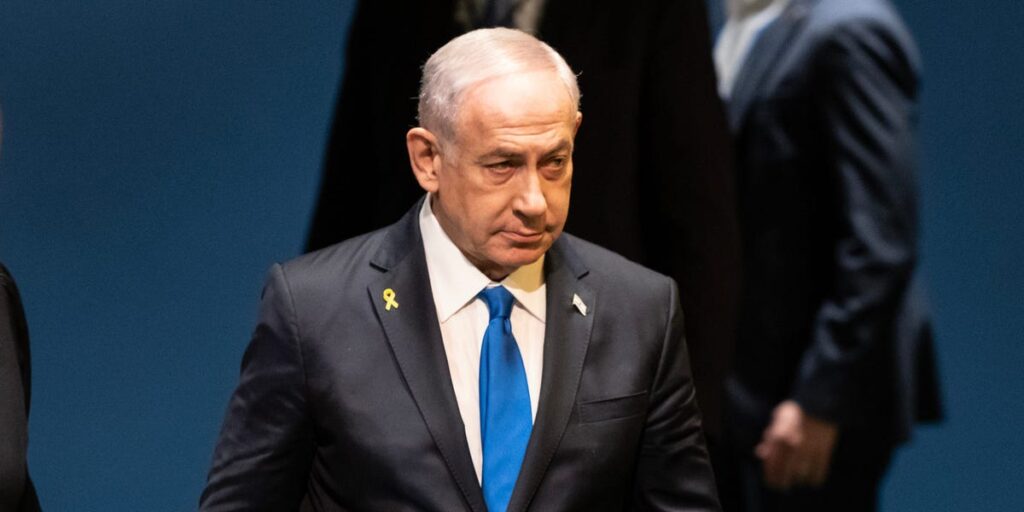- Israel launched a “limited” ground offensive in Lebanon after killing a top Hezbollah leader in airstrikes.
- The attacks came just days after the US called for a 21-day cease-fire on September 25.
- Foreign policy experts said Israeli Prime Minister Benjamin Netanyahu cannot be constrained by the US.
The Israel Defense Forces, in a statement, confirmed it had begun a “limited, localized, and targeted” ground offensive in Lebanon early Tuesday local time, aimed at the Iran-backed militant organization, Hezbollah, after trading back-and-forth strikes with the group for nearly a year.
The ground offensive came after a series of airstrikes on September 27 that killed Hezbollah’s longtime chief, Hassan Nasrallah, a major victory for Israeli Prime Minister Benjamin Netanyahu.
That Israel conducted the operations just days after the US called for a 21-day cease-fire on September 25, however, only reinforces that Israel has its own interests, and a now-emboldened Netanyahu won’t easily be reined in by the US, which has so far failed to deescalate the situation since the October 7, 2023, Hamas terrorist attack, foreign policy experts told Business Insider.
The US, a key Israeli ally and intermediary in peace talks, has thus far failed to broker a cease-fire, negotiate the release of hostages being held by Hamas, or reign in civilian deaths in Israel’s fight in Gaza.
And despite increased international pressure for a cease-fire between Israel and Hezbollah following a series of deadly pager explosions in Lebanon earlier this month, Israel launched airstrikes and, now, what it is calling a “limited” ground invasion.
Chuck Freilich, a former deputy national security advisor who served for over 20 years in Israel’s security establishment, told BI that while Nasrallah’s death was seen as a major accomplishment for Israel and the US, the strike “also reinforces the long-standing dislike for Netanyahu and the belief that he is not a reliable partner for the US.”
Freilich, currently a political science professor at Columbia University, noted that the relationship between Israel and the US has been tense before — recalling a 2014 incident wherein an official in then-President Barack Obama’s administration was quoted calling Netanyahu a “chickenshit.”
Benjamin Radd, a research fellow with the UCLA Center for Middle East Development, told BI that President Joe Biden’s lame-duck status might be influencing Netanyahu’s decision-making.
“I think we have a situation where the Israeli prime minister is finding himself a window with which to operate, where internationally — or at least here in the US — there seem to be number one, distractions, and number two, a candidate whose positions on Israel’s foreign policy decisions might be more favorable toward the Prime Minister,” Radd said, referring to a potential Donald Trump win in the upcoming election.
Netanyahu, Radd said, seems to be seizing his opportunity for escalation in a way he wouldn’t necessarily do if Biden weren’t on his way out of office.
Sean McFate, a national security and foreign policy expert at Syracuse University, told BI that the airstrike is a “major escalation” in the conflict and that Israel is not a “finger puppet” to the US that will easily kowtow to outside demands.
“I think it’s hubris to think that America can just pull a leash, and Bibi does what we want,” McFate said of Netanyahu using his nickname. Israel scored a major win by taking out Nasrallah, McFate said — a move that Biden acknowledged as a “measure of justice” in the same statement in which he called for diplomacy in Gaza and Lebanon.
He added that the prime minister may also consider the US an unreliable partner.
In May, Reuters reported that the Biden administration paused a weapons shipment to Israel to oppose an apparent move to carry out an offensive into Rafah in southern Gaza.
“We have promised weapons, we don’t deliver them on time,” McFate said of Netanyahu’s possible thinking. Israel ultimately went ahead with its military plans in Rafah.
The killing of a top Hezbollah leader and the subsequent ground invasion complicates the already murky path to de-escalation.
Netanyahu, who is in a politically fraught position as he faces corruption charges (he denies wrongdoing) and has yet to secure the remaining hostages held by Hamas since last October, may now be even more emboldened, McFate said.
“The question is, what happens next? Does Israel escalate? Does Hezbollah escalate? Does Iran escalate?” McFate added. “We’re at the most volatile moment since October 7.”
Representatives for the State Department and the Israeli prime minister’s office did not respond to requests for comment from Business Insider.
Read the full article here


